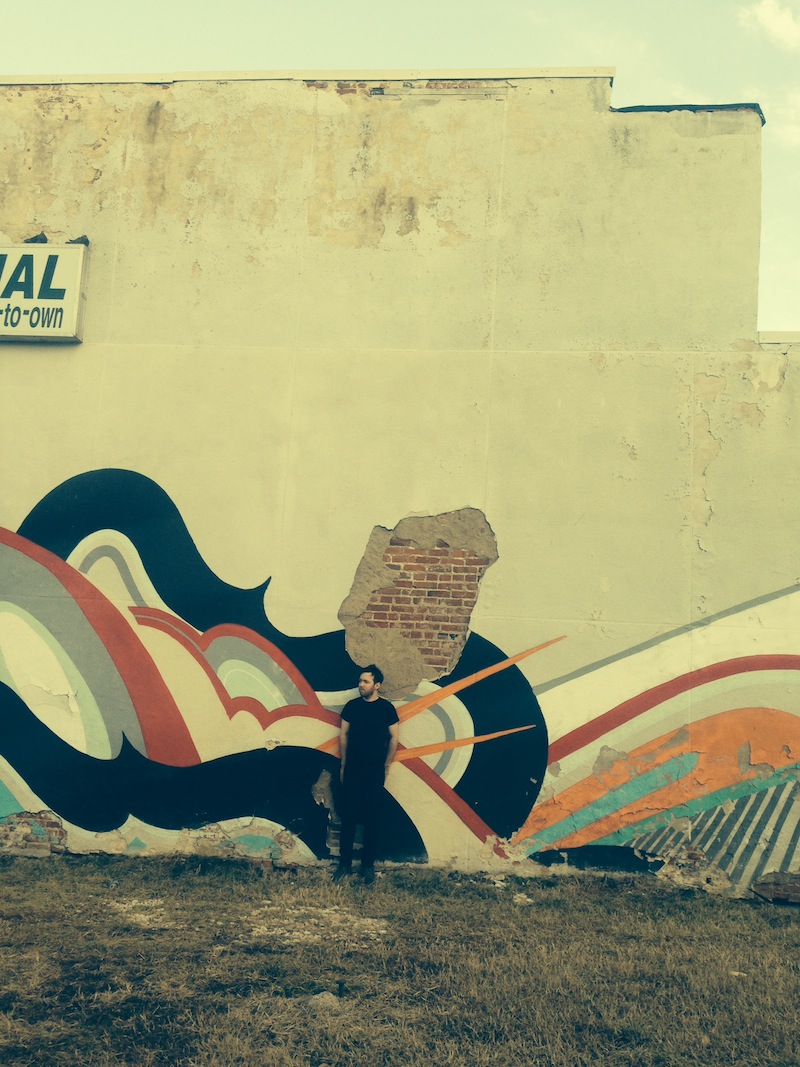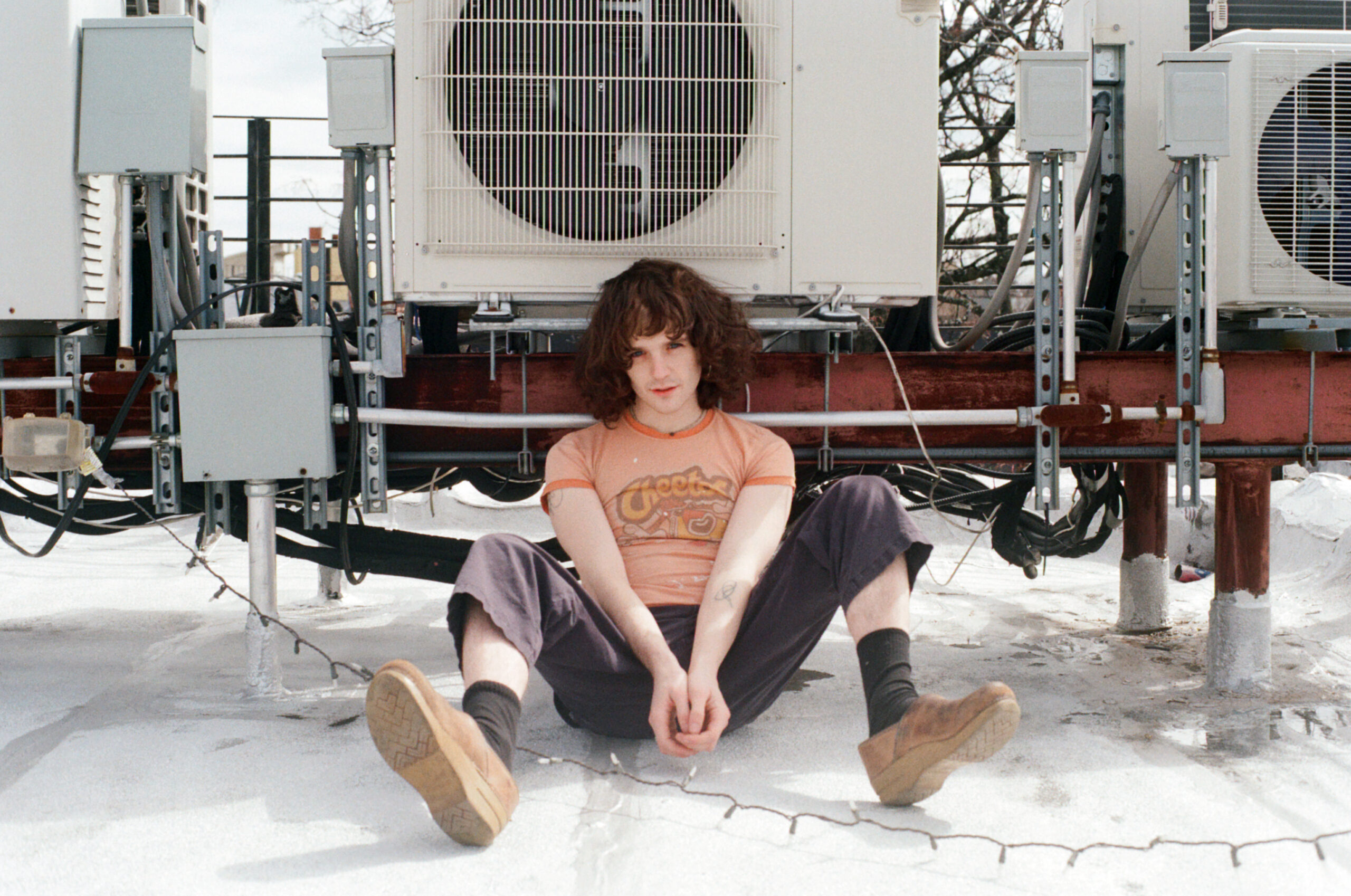Gary McClure's dexterous, lo-fi project American Wrestlers began as an idle way to pass the time. McClure is a music industry veteran who's been making music for 20+ years, but the eight-song self-titled album he thrust out into the universe last fall as a free release on Bandcamp was an act of desperation, not ambition. After his previous band (the moderately famous Manchester outfit Working For A Nuclear Free City) broke up, McClure tried his hand at a solo project under his own name, 2013's Wreaths. While the record wasn't a flop, it certainly didn't raise the kind of interest that he'd hoped for or expected.
Stripped of confidence in an ailing music industry, McClure's fate was altered by a totally different kind of collaboration. After meeting his now-wife Bridget Imperial-McClure while she was studying abroad in England, Gary left his native UK for America in order to continue their relationship. He wasn't planning to get married and settle down in the US, but when that eventually unfolded, all his instruments and former collaborators were an ocean away. So during the intervening weeks between moving to St. Louis and obtaining a green card so he could work, McClure began to construct and record the songs that make up American Wrestlers. He found a Tascam 8-Track and bass at a nearby pawn shop, and spent the time while Bridget was at school recording his songs in the couple's tiny two-room house.
It's clear that American Wrestlers is a home-recording project from jump. The tape hisses and pops like a knuckle cracking. It has the kind of ambient scuffling that happens sans studio, room noise bleeding through like an instrument in its own right. And even if it wasn't McClure's intent or preferred method, the rough, expansive songs on his album resonate with significant force. After uploading the album to the internet late last fall, he also sent it out to a handful of blogs and various tastemakers. The response was immediate and intense: people loved it.
Eventually, McClure had his pick of a multitude of labels and settled on the independent, Mississippi-based Fat Possum, who are releasing the album in April. Initially, the songs from American Wrestlers were rolled out with little to no information about McClure himself, and in this way, the careening guitar sprocket of "I Can Do No Wrong" and grunge-and-gloom of "Kelly" were allowed to stand alone. But today we're premiering the third release from the album, "There's No Crying Over Me Either," along with a lengthy interview with McClure. He's cynical about the music industry, flabbergasted that his Hail Mary of a home recording was the one that finally connected, but also warm and frank in the way veteran musicians often are. Listen to "There's No Crying Over Me Either" below and read our Q&A with the man behind American Wrestlers.
STEREOGUM: Hi, Gary. How are you?
GARY MCCLURE: Sorry it's so late. I'm currently working on a warehouse dock loading trucks, and they have me working from like 7 a.m. to 6 at night, so I have to try to get the time to speak to people. I'm doing that on one side, then I've got a lunch break getting messages from journalists and stuff. It's a weird experience.
STEREOGUM: I figured you must have a day job since you were only available in the evening.
MCCLURE: Because musicians do, don't they? These days you have to. Anything to pay the bills.
STEREOGUM: We had a column on Stereogum called Quit Your Day Job where we'd interview musicians who had full-time jobs.
MCCLURE: That sounds like the most depressing article ever. Like, here's my dream and here's the crushing reality.
STEREOGUM: Well, how has it felt for you to finally start getting attention for your music as American Wrestlers?
MCCLURE: I mean, it's weird. I've not really heard much. I've heard a little bit, but I can't see a big picture. I've been making music for like 20 years. The last time I recorded on like a 4-track or an 8-track was when I was like 13-14 in my bedroom. And this is the first thing I've recorded on 8-tracks since then.
STEREOGUM: When did you first start making music? What music were you making before American Wrestlers?
MCCLURE: I was a kid who was into grunge bands and stuff, like the Smashing Pumpkins, Nirvana, Foo Fighters, Soundgarden, and Pearl Jam. I just loved the whole thing and that was what got me into music. Literally, I didn't like music until one day my brother put Nirvana on, and I had that moment. It just blew me away, like, "Wow people can do this on a record." I always wanted to make that kind of thing. Then I met this guy called Philip Kay who is one of the most talented people I've ever known. He's a producer and was into hip-hop, so he didn't like what I liked at the time, and I wasn't really into what he was doing. But then we had mutual ground in things like Primal Scream and Chemical Brothers, so we recorded together because we were the only two people we knew who made music. We had this band in Manchester called Working For A Nuclear Free City that was kind of a compromise. We were a shoegaze-electronic crossover band.
STEREOGUM: Was that band successful?
MCCLURE: We did okay, we did an American tour, and we were nominated for the Shortlist Music Prize. We were in the last 10 up against Feist and Arcade Fire and stuff, and we got music on TV shows and film and all that shit. It was the kind of band [where] you get 100,000 views on YouTube and still most people have never heard of you. We were just below being known, and we didn't have quite enough money to make people hear us. So we did that, and that didn't really work out. We always tried our best and put our heart into it, and everything we made was really critically well-received, and each time I thought, this is it. We're going to do really well. And we never did. So that kind of faded out, and then I wrote this album called Wreaths, which I put out under my own name, which was just stupid. I should have thought up a clever name.
STEREOGUM: How was the reaction to Wreaths?
MCCLURE: I really thought this would be the one that's going to make it. It has all these lush string arrangements on it and everything, and it went nowhere as well. So I was just like shit, man. No one is ever going to hear my music. Finally I was fully convinced that -- I mean really convinced this time -- that no one would ever hear anything I ever made and that I would never make any money. I mean, you can't make any money now. But really I was so completely convinced by this. Then I met my wife and I got married and I ended up in a little house in St. Louis. I had to leave all my equipment at home so I had nothing. And my wife Bridget -- she's studying music therapy -- so she has a Yamaha fake piano, and an Ibanez guitar. I went to a pawn shop and got a bass and a Tascam 8-track, and I don't know why but I kept making music because, I guess I can't help it or something.
STEREOGUM: Do you feel like you are just compelled to make music? It's something you have to do?
MCCLURE: It never feels that dramatic. People say that, don't they? And it's like this poetic thing. It's more a case of I'm watching TV and playing guitar and it's like, oh, there's another song. That kind of shit. But I had an 8-track and last year I wrote a bunch of songs and when they were finished, I thought, What if I just try it this time with no record labels? Nothing. All pure. I'll just do it on my own. I'll have a day job, and for the rest of my life I'll just work things out and I'll send them out into the internet, maybe some blogs, and some people will hear them, maybe. I gathered 200 blogger email addresses and I spammed all these guys like, Hey look, I made this stuff on an 8-track. The next day, this guy from a website wrote back and said he totally loved it. I was like, wow, shit! There's someone actually really into it. Then the next day, there was two more, and the next day there was more after that. It was getting really silly, and then I was starting to get a bit scared from the response. Then the next week, I think it was like eight record labels emailed me.
STEREOGUM: Why did you decide to go with Fat Possum?
MCCLURE: I looked at their roster, the bands that they had. It's just like, shit, there's so many good bands. You could tell by the choices of acts that they're just a little bit more willing, that they actually believe in the music they're putting out -- they're giving something a chance because they like it. Fat Possum was one of the ones that reached out initially and first asked if they could buy a record. When I said I didn't have any physical copies he said, "I'll start the presses on Monday if you want." So that was kind of it. That was around September last year.
STEREOGUM: I want to hear how you met your wife because you wouldn't have made this record if you hadn't left Manchester and come to the US, right?
MCCLURE: I guess that's true. It's not quite as exciting as you think. She was over in the UK [for school] and she came back because it's cheaper over here. She already did a degree, and she's getting a second one. We met over there, nothing all that exciting.
STEREOGUM: So you met her, fell in love and said, "Fuck it, I'm moving to the US"?
MCCLURE: Well, when you're staying in a shitty little bedroom in Manchester it's a no-brainer. I came here for three months in 2013, and then I came back. We live in the city of St. Louis and it's one of those places where it's really nice, and then you turn a corner and it's all fucking hell. Starting to get a bit scared. It's rough. I'm hearing sirens and gunshots all night.
STEREOGUM: I was struck by one of your earliest songs, "Kelly," and what you told Fader about the inspiration for it, a mentally ill homeless man named Kelly who the police beat to death.
MCCLURE: Watch the video. It's horrific. There's no words. It's just ridiculous. And the fact that they got off and all that... it just feels a bit sad when things like that just disappear. That's someone's son, that guy. And the full Ferguson thing happened after I finished it. I'd finished the album by then, I think, but "Kelly" kind of became more relevant. But that's kind of always gone on, hasn't it?
STEREOGUM: Obviously the name American Wrestlers has a ton of connotations for people. First, there's the thought of pro wrestling and the fake drama of that whole scene. But then there's also the flip side, which is the actual sport of wrestling, which is a brutal, dignified thing, and they're basically polar opposites. Did you have that ambiguity in mind when you chose it?
MCCLURE: No, and I did think of that later on, about the first thing you said, the fakery. But a friend of mine was telling me that when he was a child, a kid in his class -- this was in England -- the teacher asked him what he wanted to be when he grew up, and this English kid said, "I want to be an American wrestler." Because the WWF was big, and so [my friend] thought it was really funny how stupid that was, how moronic this kid was. He said, "Actually, that's not a bad name for a band." This is something he said years ago and it stuck in my mind.
STEREOGUM: Are you considering going into music full-time for American Wrestlers and quitting your job?
MCCLURE: Would I quit it? [laughs] Are you insane? I've quit so many jobs for this. It's like, my whole life all I did is quit jobs for music. Yeah, of course I would. I'd sacrifice everything for it completely and utterly. You take that risk all the time, and you come back and you're financially ruined, and you've taken out payday loans and shit, and you're in this huge financial hole and you don't think you'll ever get out of, and you manage to crawl your way back out of with a job. And someone says, "Hey, come play SXSW" and you think, "Shit, I'm going have to do this again." There will never be a light at the end of the tunnel. But yes, completely.
//
American Wrestlers is out on 4/7 via Fat Possum. Pre-order it here.






